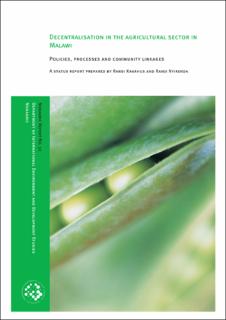| dc.description.abstract | Based on the 1998 Decentralisation Policy and Local Government Act, the National Decentralisation Programme in Malawi in 2001 initiated a coordinated process aimed at devolving power and resources to local assemblies, with the District Assembly level playing a paramount role. This report focuses on the decentralisation process in the agricultural sector in the context of national decentralisation policies and programmes. Decentralisation involves set of decisions leading to shifts in the locus of power from the centre towards the periphery. In this implementation process, the Ministry of Agriculture was given extensive powers to influence the exercise of devolving (their own) powers, functions and responsibilities to the District level. But there appears to be fragile capacity within the government system in managing this complex reform process. And at higher levels, there is still considerable reluctance to devolve power and decentralise resources.
In the agricultural sector, and more specifically within the area of responsibility of the former Department of Agricultural Extension Services, decentralisation could build on already existing structures at local levels. Devolution, however, means that a strictly top down system in terms of power, decision-making, accountability and information flow, had to be changed. In the negotiations to change this system, lack of capacity is often used as a multi-purpose argument in the quest to maintain power at higher levels.
In order to move beyond what has so far been achieved in terms of decentralising the responsibility for extension services to the District level, a more pro-active leadership and ownership to the process is required in the agricultural sector as a whole. More direct institutional links can be developed between the District level/ Extension Planning Area level and the research and experiment stations under the Ministry’s Department of Agricultural Research Services. Eventually, the formerly established Agricultural Development Divisions (ADDs) may be phased out to promote more efficient and effective use of resources. Furthermore, in the implementation of the new Agricultural Extension Policy at the local level, extension officers should be given a special mandate to make sure that the “Those who benefit pay”-principle is not translated into service-provision based on “Those who pay benefit”.
Support to capacity and competence building in agriculture and natural resource management should include explicit priorities aimed at responding to the challenges and needs at the decentralised DA, Area and village levels. Programme and project funding from the Norwegian side should be based on a careful scrutiny of to what extent the funded activities may actually undermine fledgling local government structures and decentralised development-oriented activities. By providing funds that are channelled to properly managed District Development Funds (DDFs) – and possibly earmarked for the agricultural sector – participatory-democracy processes of decision-making and agricultural-development initiatives at village level can be strengthened, together with the formally established, but not necessarily operative structures of stakeholder panels within the District agricultural sector. At the same time, village-level agricultural development initiatives could be supported through the DDF mechanism.
Research projects and technology development funded through Norwegian programmes, could be used to forge stronger links between higher education and research institutions, Malawian research and experiment stations, and the decentralised District Agricultural Development Offices and Extension Planning Areas at local levels, thus contributing to promoting demand-driven agricultural research. | en_US |

